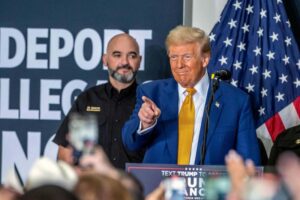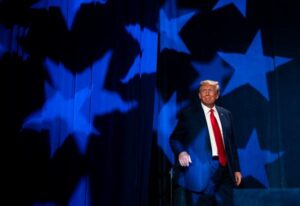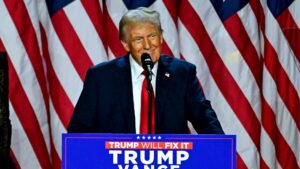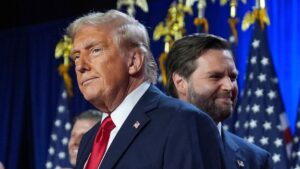Aftermath of Donald Trump’s Election: The World React
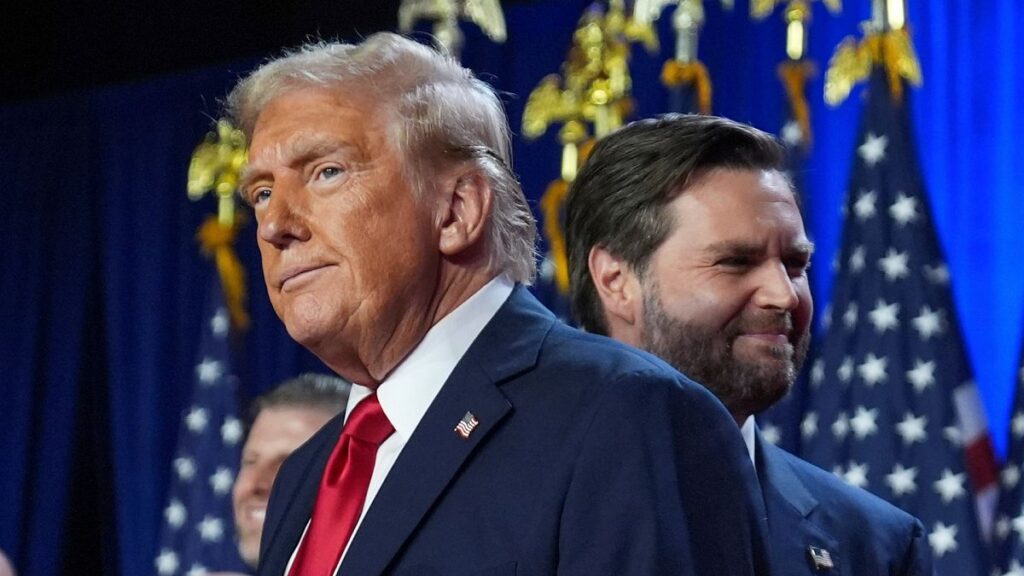
Donald Trump’s re-election as U.S. President has brought on some conversations around the world regarding what this might mean for both national and international policies. During his term in the White House previously, Trump touted an “America First” policy that included the protection of American interests and a decrease in American participation in fights oversea. Through this rhetoric of immigration control, trade, and national security, Trump appears to present the image of a self-sustaining America, which operates independently of global alliances. His presidency is going to create some significant changes in the relationships of America with countries such as China and Afghanistan, European allies, and countries in the Middle East. Below, we analyze some of the primary expected impacts of re-election of Trump on the U.S. and the world.
1. America First: The Nucleus of Trump’s Policies
In fact, Bolton provides valuable insight in his memoir about the approach of Trump: One of his most telling memories is the critical meeting on Afghanistan, where Trump asked intelligence officials if Afghanistan could still pose a threat to the United States. When informed that it would not, he directed an expedient withdrawal, stating that any near-term resurgence in terrorism should fall to Afghanistan’s neighbors and not America. Perhaps the most defining characteristic of Trump’s leadership is an utter disregard for consequences that might come with his choices in regards to Afghan stability-over short-term American interest versus long-term global stability.
Such an orientation to immediate American interests reinforces the view that Trump will continue retreating further into international responsibilities, particularly in areas that he perceives as economically costly or politically taxing. His policies are aligned toward diminishing the influence of the United States abroad, an approach that doubtless will have far-reaching consequences for international stability.
2. Immigration Policies: A Stronger Approach on Border Security
Immigration constitutes an essential part of Trump’s domestic policy. As a candidate in the 2024 campaign, the former president reinstated claims that the country would secure its borders, have the undocumented deported, and reduce asylum access roads. This policy aligns with his efforts during the first term to reduce illegal immigration through a border wall constructed, alongside more stringent policies.
Trump’s renewed efforts would make it even tougher for Latin American immigrants to seek refuge in the U.S. Increased restrictions on documented immigrants would mean that there’s even less of a welcoming environment. Implications of this tightened immigration policy would also reach far beyond the U.S. borders, since many Latin American countries rely on remittances from migrants working in America. These could hence economically affect these countries, and create debates on human rights as well as the support of migrants worldwide.
3. Foreign Policy Focus: The Containment of China
Trump has always defined China as the United States’ main economic and strategic rival, and this stance is unlikely to change during his second term. He has engaged in trade tariffs and intellectual property disputes against China in his previous term, and he will likely continue trying to constrain China’s economic power in his new term, especially in technology, manufacturing, and infrastructure.
Such an adversarial posture could strain U.S.-China relations even further and also harm economies reliant on both countries for economic and technological collaborations. The “Made in China 2025” initiative, which will eventually make China a global leader in a few sectors of technology, may attract pushback from the United States. As Trump thumps the table harder, so will the U.S. retaliate by curtailing technology exports or raising tariffs or teaming up with allies to curtail Chinese influence. This is very important to understand since countries in Asia, Europe, and Africa get caught between these two giants who benefit from Chinese investments.
4. Middle East Policy: Pro-Israel Policy
He has already done something quite unprecedented in the Middle Eastern policy, for instance, by moving the U.S. Embassy from Tel Aviv to Jerusalem-an extremely controversial step, very much in tune with the interest of Israelis. His administration’s “Abraham Accords” did help facilitate some diplomacies between Israel and some Arab nations, but really put aside the Palestinian question; hence his potential as a mediator is disputable.
Well, in this term, Trump’s policies may further consolidate the position of Israel. He says he wishes to end the Middle Eastern wars, but in all likelihood, he will ensure it is a solution beneficial to Israel itself at the cost of an balanced resolution. His son-in-law and advisor, Jared Kushner, is a noted Israel apologist; such influences may be evident in his policies. Though Trump will try to negotiate a peace accord, it will for sure be an endeavor that serves the interests of Israel, thus widening regional rifts.
5. The Ukraine Conflict: Rethinking U.S. Engagement
The first thing he promised to end on the campaign trail is Ukraine. His strategy is most likely to be reduced spending more on diplomatic solutions but in return reducing U.S. involvement and has expressed frustration that should it be stopped or curbed, it will significantly hinder Ukraine’s ability to fund and carry out its defense against Russia.
Trump’s policy shift on Ukraine would also affect the nature of NATO as the European allies may have to stretch forward more. Trump earlier criticized NATO allies for not paying enough dollars to the alliance, and a reduced inflow from Washington can create rifts between the U.S. and the European countries. If the European countries do not strengthen their support, Trump would scale down U.S. participation in NATO and may even cause fractures in the Western alliance.
6. Iran: Return to Hostility
As he nears the end of his first term, Trump has moved farther away from the Iran nuclear deal, so creating further escalation between both nations. In this term, it is likely that he is going to continue taking a hard stance on Iran and supporting its sanctions as well as maybe nudging Israel into action over Iran’s nuclear ambitions. This might escalate hostilities further in the Middle East, and there may be increased hostilities between Iran and U.S.-backed allies.
Trump’s Iran policy may further disintegrate the fragile peace that Biden’s diplomatic effort has inspired. The new surge in interest on Iran’s nuclear capabilities is likely to make security hotter for countries like Saudi Arabia, United Arab Emirates, and Israel. These countries may become more aggressive as they already are fearful of Iran’s influence and try to increase their defense budgets while, at the same time, strengthening their relations with the US.
7. The US-Pakistan Relationship: A Balanced Approach?
Trump may have a cautious but strategic approach toward Pakistan in South Asia, but influenced heavily by Pakistan’s close relationship with China. Trump has been less interested in Pakistan himself; he is more likely to look at it from the perspective of the relationship U.S. needs to have with Afghanistan and India. Now that China seems like his biggest competitor, Trump may want to be aggressive toward countries allied with China, such as Pakistan.
Pakistan will have to walk a thin rope between the U.S. and China, an extremely delicate balancing act that may become more onerous with Trump. Though he may not be openly hostile, he will be able to push Pakistan into distancing itself from China, especially from CPEC. This may put Pakistan-U.S. ties in a tight spot because Pakistan needs China for economic boom and regional security guarantees.
8. Imran Khan and U.S. Pressure: A Complex Scenario
Well publicized is whether Trump will be acting on behalf of former Pakistani Prime Minister Imran Khan. Khan enjoys massive popularity among the Pakistani diaspora in the U.S., who may lobby; also, Zulfi Bukhari, one of Khan’s closest associates, is known to have ties with Kushner in the Trump administration. However, whatever the proclamations, any actions taken by Trump would not end up an actual policy of America. Trump may go on record through media or public statements to express casual concern, but he is unlikely to make diplomatic argument stick.
Conclusion: A New Stage in International Diplomacy
His “America First” ideology will potentially shift U.S.-wideworld relations in his second term. His stance on immigration and foreign intervention will impact Latin America, Europe, and the Middle East. His brash style with China and Iran will alter the U.S. strategy in Asia. These policies are the reflection of an appetite of America to come out of the shackles of international collaborations, which may challenge the traditional global diplomacy.
While his focus is mostly inward, the foreign policy decisions of Trump will undoubtedly have reverberations on the world stage. With strained alliances, stricter immigration policies, and renewed emphasis on rivals like China, Trump’s re-election will impact not only America but also the global balance of geopolitical influence. For allies and competitors, this new world in U.S. foreign policy will require being nimble, diplomatic, and attentive to various interests.

